SOLAWI Gärtnerei Fuldaaue
Solidarische Landwirtschaft
GEMEINSAM WIRTSCHAFTEN Solidarische Landwirtschaft vereint das neue Denken einer lokalen, verbrauchernahen Lebensmittelproduktion mit ökonomisch tragfähigen Prinzipien. Der Grundsatz ist einfach: Als Mitglied einer SOLAWI zahlt man einen festen monatlichen Beitrag und erhält als Gegenleistung ein bestimmtes Kontingent frischer Gemüse- und Nahrungsprodukte. Dieses fällt je nach Wetterlage, saisonalen Gegebenheiten oder Unwägbarkeiten mal üppiger, mal schmaler aus. Der Vorteil: Die Gemeinschaft trägt Risiken wie Missernten und andere Ausfälle gemeinsam und verteilt so das Risiko einer solchen naturnahen Produktion auf alle Schultern.
WISSEN TEILEN Durch das v-Prinzip wird gerade im stadt- nahen Raum die Möglichkeit geschaffen, ökologisch sinnvoll mit den lokalen Gegebenheiten umzugehen und zu wirtschaften. Die SOLAWI-Gärtnerei Fuldaaue zeigt darüber hinaus, wie auf dieser Basis ein ganzes Netzwerk für interdisziplinären Wissensaustausch geschaffen werden kann. Die Mitglieder sind selbst dazu eingeladen, bei der Pflege der Acker- und Beetflächen mitzuhelfen. So entsteht ein intensiver Kontakt und Austausch zwischen Konsument:innen, Produzent:innen, Produkt und Landschaft. Den Mitgliedern werden learning by doing in Handarbeit die komplexen Wechselwirkungen zwischen Flora und Fauna, Boden und Pflanze, Mensch und Nahrungsmittel, Wetter und Klima vertraut. Die eigene Ernährung kommt wieder in direkten Kontakt mit lokalen Größen wie Jahreszeiten, Saisons, Wachstum und Ruhephasen.
HARTE ARBEIT Gleichzeitig erlebt man selbst, wie hart und beschwerlich die Feldarbeit ist und welchen Aufwand es braucht, um die eigene Ernährung sicherzustellen. Die Ambivalenz zwischen Anspruch und Wirklichkeit einer exaltierten Konsumgesellschaft, die durchweg daran gewöhnt ist, alles von überall und zu jeder Zeit zur Verfügung zu haben, wird konfrontiert mit dem saisonalen und jahreszeitlich bedingten Sortenangebot des eigenen Ackers. Dass dieses Weniger im Falle ein großes Mehr ist, ist sicher ein langwieriger und an- strengender Lernprozess, den es zu durchlaufen nicht nur lohnt, sondern der angesichts der dramatischen klimatischen Lage zum Muss wird, wenn wir überleben wollen.
REDUKTION VS. MASSENKONSUM Zudem ist es offen- sichtlich, dass es schier unmöglich ist, unseren aktuellen Lebensstandard, der die Welt zunehmend konsumiert und uns so die eigene Lebensgrundlage entzieht, beizubehalten, wenn wir ökologisch sinnvoll wirtschaften wollen. Die zwingende Logik ist klar: Statt dauerhaftem Wachstum benötigen wir eine klare Reduktion unseres Konsums und eine Neuorientierung. Denn die Befriedigung unserer Bedürfnisse kann genauso und noch besser durch lokale Qualitäten und Güter gedeckt werden: dann, wenn wir unser Interesse vom globalen Massenkonsum auf konzentrierte lokale Qualitäten neu orientieren, die nicht nur Produkte, sondern ein ganzheitliches Wechselspiel von Leben, Ort, Landschaft und Gemeinschaft umfassen.
INTERDISZIPLINÄRER ACKER Die Gründer der SOLAWI-Gärtnerei Fuldaaue, Timo und Thomas, arbeiten mit ihrem Team also nicht nur für eine lebenswerte und überlebensfähige Zukunft, sondern verknüpfen ihre Arbeit mit der Vermittlung interdisziplinärer Inhalte. Ihre Mitarbeiter:innen studieren in verschiedensten Fächern wie Politik- oder Sozialwissenschaften, verfolgen neben der solidarischen Landwirtschaft Themen wie „Terra Preta“ oder versuchen neue Lebensentwürfe durch die Verknüpfung verschiedener Berufspraktiken in die Tat umzusetzen.
GLOBALOKAL Die SOLAWI-Gärtnerei Fuldaaue ist eines der herausragenden Beispiele für urbane Landwirtschaft. Die lokalen Bedingungen der Flutungsauen der Fulda machen hier auf dem ehemaligen Grundstück einer Gärtnerei das Wirtschaften quasi mitten in der Stadt möglich. Im direkten Austausch mit Nachbarn wie dem Blüchergarten, dem Selbsterntefeld oder dem Mitgliederladen bildet die
SOLAWI einen kompakten Wissensbestand ab, der von lokal gewonnenen Erkenntnissen auch Rückschlüsse auf regionale bis globale Wechselwirkungen zulässt. Die SOLAWI ist damit ein herausragendes Beispiel dafür, wie eine junge Generation im lokalen Kontext zukunftsweisende ökologische wie gesellschaftliche und solidarische Praktiken ganz real und bodenständig erprobt, diskutiert und weiterentwickelt.
SOLAWI Gärtnerei Fuldaaue
Solidarity Agriculture
COMMUNITY ECONOMY Community-supported agriculture (German: Solidarische Landwirtschaft; SOLAWI for short) combines a new way of thinking about local, consumer oriented food production with economically viable principles. The premise is simple: as a member of a SOLAWI group, you pay a fixed monthly contribution and receive a certain quota of fresh vegetables and food products in return. The amount may vary depending on the weather, seasonal conditions, and other unpredictable factors. The advantage is that the risks of a production process so closely tied to nature, such as crop failure and other shortfalls, are shared by all members of the community. The weekly vegetable box is thus produced in a closed-loop system, which is resource-saving, socially responsible, and in harmony with natural conditions.
SHARED KNOWLEDGE The SOLAWI principle creates the opportunity to approach and manage local conditions in an ecologically sensible way, especially in areas close to the city. The SOLAWI Gärtnerei Fuldaaue (SOLAWI Nursery Fuldaaue) also demonstrates how an entire network for interdisciplinary knowledge sharing can be created on this basis. The members themselves are invited to help take care of the fields and beds. This results in intensive contact and exchange between consumers, producers, the product, and the landscape. Through “learning by doing,” members become familiar with the complex interactions between flora and fauna, soil and plants, hu- mans and food, weather and climate. Their own nutrition is brought back into direct contact with local variables such as seasons as well as growth and rest periods.
HARD WORK At the same time, members can see for them- selves how hard and arduous it is to work in the fields and the effort it takes to ensure the cultivation of your own food. The tension between the demands and the reality of an exalted consumer society that is accustomed to having everything available from everywhere at any time is confronted by the seasonal and cyclical offerings of your own field. Appreciating that this less is in fact a great deal more is certainly a long and strenuous learning process; however, it is one that is not only worthwhile, but indeed necessary for our survival in light of dramatic climate change.
REDUCTION VS. MASS CONSUMPTION Moreover, it is obvious that it is almost impossible to maintain our current standard of living, which is increasingly consuming the world and depriving us of our own livelihood, if we want to operate in an ecologically sound manner. The compelling logic is clear: instead of sustained growth, we need a marked reduction in our consumption and a total reorientation. For local goods and products can meet our needs just as well and even better if we realign our interests away from global mass consumption and toward a focus on local qualities, which not only includes products but also the holistic interaction between life, location, landscape, and community.
INTERDISCIPLINARY FIELD Together with their team, the founders of the SOLAWI Gärtnerei Fuldaaue Timo and Thom- as are not only working toward a livable and viable future; they are also combining their work with the teaching of interdisciplinary content. Their employees study a wide variety of subjects such as political or social sciences, exploring topics such as “terra preta” in addition to community-supported agriculture, or attempting to put new concepts for living into action by linking different professional practices.
GLOBALOCAL The SOLAWI Gärtnerei Fuldaaue is also an outstanding example of urban agriculture. The local conditions of the Fulda River floodplain make farming on the former site of a plant nursery in virtually the center of the city possible. In direct dialogue with neighbors such as the Blüchergarten, the “pick-your-own” field, and the members’ store, SOLAWI represents a compact body of knowledge that allows conclusions to be drawn about regional and even global interactions from locally gained insights. SOLAWI is thus an exceptional example of how a young generation is testing, discussing, and developing forward-looking ecological, social, and solidarity practices in a local context in a very real and grounded way.
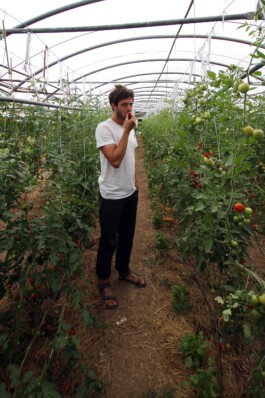
Timo, Mitbegründer der SoLaWi, Aktive
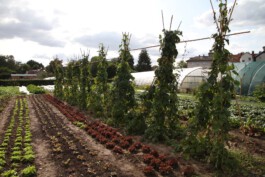
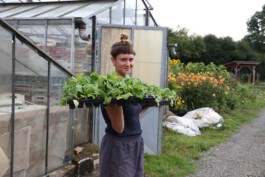
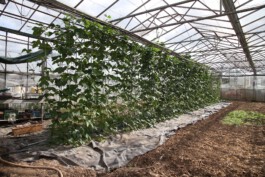
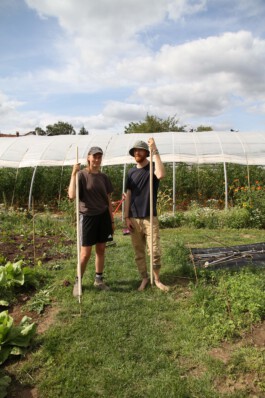
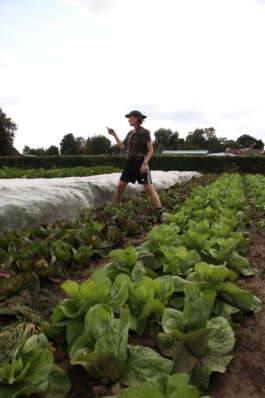
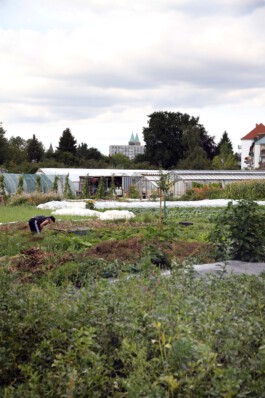
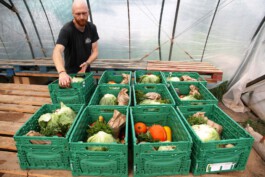
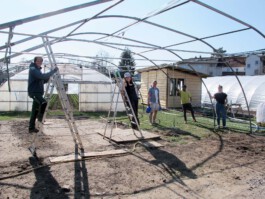
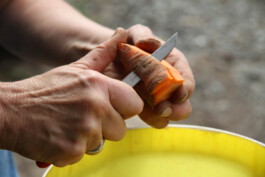
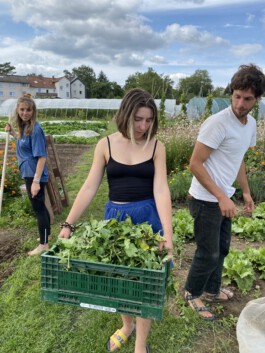
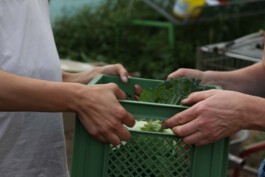
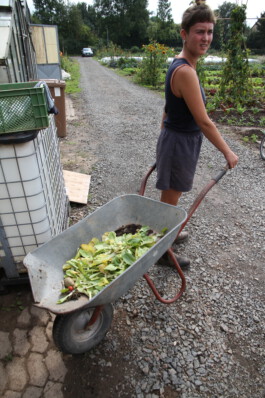
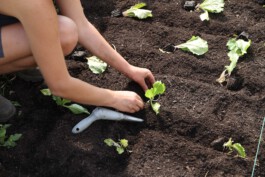
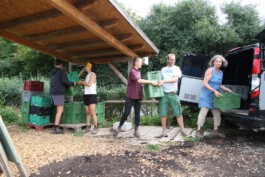
Aktive der SoLaWi, Abholung der ersten Gemüsekiste
SOLAWI Gärtnerei Fuldaaue
Solidarische Landwirtschaft
GEMEINSAM WIRTSCHAFTEN Solidarische Landwirtschaft vereint das neue Denken einer lokalen, verbrauchernahen Lebensmittelproduktion mit ökonomisch tragfähigen Prinzipien. Der Grundsatz ist einfach: Als Mitglied einer SOLAWI zahlt man einen festen monatlichen Beitrag und erhält als Gegenleistung ein bestimmtes Kontingent frischer Gemüse- und Nahrungsprodukte. Dieses fällt je nach Wetterlage, saisonalen Gegebenheiten oder Unwägbarkeiten mal üppiger, mal schmaler aus. Der Vorteil: Die Gemeinschaft trägt Risiken wie Missernten und andere Ausfälle gemeinsam und verteilt so das Risiko einer solchen naturnahen Produktion auf alle Schultern.
WISSEN TEILEN Durch das v-Prinzip wird gerade im stadt- nahen Raum die Möglichkeit geschaffen, ökologisch sinnvoll mit den lokalen Gegebenheiten umzugehen und zu wirtschaften. Die SOLAWI-Gärtnerei Fuldaaue zeigt darüber hinaus, wie auf dieser Basis ein ganzes Netzwerk für interdisziplinären Wissensaustausch geschaffen werden kann. Die Mitglieder sind selbst dazu eingeladen, bei der Pflege der Acker- und Beetflächen mitzuhelfen. So entsteht ein intensiver Kontakt und Austausch zwischen Konsument:innen, Produzent:innen, Produkt und Landschaft. Den Mitgliedern werden learning by doing in Handarbeit die komplexen Wechselwirkungen zwischen Flora und Fauna, Boden und Pflanze, Mensch und Nahrungsmittel, Wetter und Klima vertraut. Die eigene Ernährung kommt wieder in direkten Kontakt mit lokalen Größen wie Jahreszeiten, Saisons, Wachstum und Ruhephasen.
HARTE ARBEIT Gleichzeitig erlebt man selbst, wie hart und beschwerlich die Feldarbeit ist und welchen Aufwand es braucht, um die eigene Ernährung sicherzustellen. Die Ambivalenz zwischen Anspruch und Wirklichkeit einer exaltierten Konsumgesellschaft, die durchweg daran gewöhnt ist, alles von überall und zu jeder Zeit zur Verfügung zu haben, wird konfrontiert mit dem saisonalen und jahreszeitlich bedingten Sortenangebot des eigenen Ackers. Dass dieses Weniger im Falle ein großes Mehr ist, ist sicher ein langwieriger und an- strengender Lernprozess, den es zu durchlaufen nicht nur lohnt, sondern der angesichts der dramatischen klimatischen Lage zum Muss wird, wenn wir überleben wollen.
REDUKTION VS. MASSENKONSUM Zudem ist es offen- sichtlich, dass es schier unmöglich ist, unseren aktuellen Lebensstandard, der die Welt zunehmend konsumiert und uns so die eigene Lebensgrundlage entzieht, beizubehalten, wenn wir ökologisch sinnvoll wirtschaften wollen. Die zwingende Logik ist klar: Statt dauerhaftem Wachstum benötigen wir eine klare Reduktion unseres Konsums und eine Neuorientierung. Denn die Befriedigung unserer Bedürfnisse kann genauso und noch besser durch lokale Qualitäten und Güter gedeckt werden: dann, wenn wir unser Interesse vom globalen Massenkonsum auf konzentrierte lokale Qualitäten neu orientieren, die nicht nur Produkte, sondern ein ganzheitliches Wechselspiel von Leben, Ort, Landschaft und Gemeinschaft umfassen.
INTERDISZIPLINÄRER ACKER Die Gründer der SOLAWI-Gärtnerei Fuldaaue, Timo und Thomas, arbeiten mit ihrem Team also nicht nur für eine lebenswerte und überlebensfähige Zukunft, sondern verknüpfen ihre Arbeit mit der Vermittlung interdisziplinärer Inhalte. Ihre Mitarbeiter:innen studieren in verschiedensten Fächern wie Politik- oder Sozialwissenschaften, verfolgen neben der solidarischen Landwirtschaft Themen wie „Terra Preta“ oder versuchen neue Lebensentwürfe durch die Verknüpfung verschiedener Berufspraktiken in die Tat umzusetzen.
GLOBALOKAL Die SOLAWI-Gärtnerei Fuldaaue ist eines der herausragenden Beispiele für urbane Landwirtschaft. Die lokalen Bedingungen der Flutungsauen der Fulda machen hier auf dem ehemaligen Grundstück einer Gärtnerei das Wirtschaften quasi mitten in der Stadt möglich. Im direkten Austausch mit Nachbarn wie dem Blüchergarten, dem Selbsterntefeld oder dem Mitgliederladen bildet die
SOLAWI einen kompakten Wissensbestand ab, der von lokal gewonnenen Erkenntnissen auch Rückschlüsse auf regionale bis globale Wechselwirkungen zulässt. Die SOLAWI ist damit ein herausragendes Beispiel dafür, wie eine junge Generation im lokalen Kontext zukunftsweisende ökologische wie gesellschaftliche und solidarische Praktiken ganz real und bodenständig erprobt, diskutiert und weiterentwickelt.
SOLAWI Gärtnerei Fuldaaue
Solidarity Agriculture
COMMUNITY ECONOMY Community-supported agriculture (German: Solidarische Landwirtschaft; SOLAWI for short) combines a new way of thinking about local, consumer oriented food production with economically viable principles. The premise is simple: as a member of a SOLAWI group, you pay a fixed monthly contribution and receive a certain quota of fresh vegetables and food products in return. The amount may vary depending on the weather, seasonal conditions, and other unpredictable factors. The advantage is that the risks of a production process so closely tied to nature, such as crop failure and other shortfalls, are shared by all members of the community. The weekly vegetable box is thus produced in a closed-loop system, which is resource-saving, socially responsible, and in harmony with natural conditions.
SHARED KNOWLEDGE The SOLAWI principle creates the opportunity to approach and manage local conditions in an ecologically sensible way, especially in areas close to the city. The SOLAWI Gärtnerei Fuldaaue (SOLAWI Nursery Fuldaaue) also demonstrates how an entire network for interdisciplinary knowledge sharing can be created on this basis. The members themselves are invited to help take care of the fields and beds. This results in intensive contact and exchange between consumers, producers, the product, and the landscape. Through “learning by doing,” members become familiar with the complex interactions between flora and fauna, soil and plants, hu- mans and food, weather and climate. Their own nutrition is brought back into direct contact with local variables such as seasons as well as growth and rest periods.
HARD WORK At the same time, members can see for them- selves how hard and arduous it is to work in the fields and the effort it takes to ensure the cultivation of your own food. The tension between the demands and the reality of an exalted consumer society that is accustomed to having everything available from everywhere at any time is confronted by the seasonal and cyclical offerings of your own field. Appreciating that this less is in fact a great deal more is certainly a long and strenuous learning process; however, it is one that is not only worthwhile, but indeed necessary for our survival in light of dramatic climate change.
REDUCTION VS. MASS CONSUMPTION Moreover, it is obvious that it is almost impossible to maintain our current standard of living, which is increasingly consuming the world and depriving us of our own livelihood, if we want to operate in an ecologically sound manner. The compelling logic is clear: instead of sustained growth, we need a marked reduction in our consumption and a total reorientation. For local goods and products can meet our needs just as well and even better if we realign our interests away from global mass consumption and toward a focus on local qualities, which not only includes products but also the holistic interaction between life, location, landscape, and community.
INTERDISCIPLINARY FIELD Together with their team, the founders of the SOLAWI Gärtnerei Fuldaaue Timo and Thom- as are not only working toward a livable and viable future; they are also combining their work with the teaching of interdisciplinary content. Their employees study a wide variety of subjects such as political or social sciences, exploring topics such as “terra preta” in addition to community-supported agriculture, or attempting to put new concepts for living into action by linking different professional practices.
GLOBALOCAL The SOLAWI Gärtnerei Fuldaaue is also an outstanding example of urban agriculture. The local conditions of the Fulda River floodplain make farming on the former site of a plant nursery in virtually the center of the city possible. In direct dialogue with neighbors such as the Blüchergarten, the “pick-your-own” field, and the members’ store, SOLAWI represents a compact body of knowledge that allows conclusions to be drawn about regional and even global interactions from locally gained insights. SOLAWI is thus an exceptional example of how a young generation is testing, discussing, and developing forward-looking ecological, social, and solidarity practices in a local context in a very real and grounded way.

Timo, Mitbegründer der SoLaWi, Aktive














Aktive der SoLaWi, Abholung der ersten Gemüsekiste